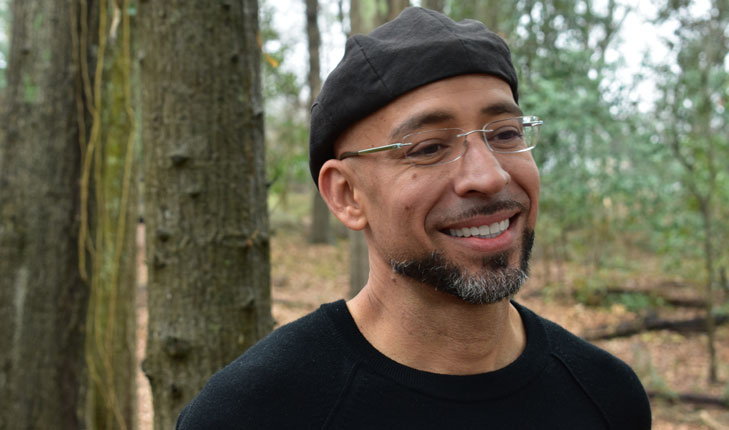The Fresno State Master of Fine Arts Program in creative writing announced Georgia author Éric Morales-Franceschini won the 2022 Philip Levine Prize for Poetry book contest, which includes a $2,000 award and publication of his debut full-length poetry collection, “Syndrome.”
The creative writing program sponsors the national prize, which honors Levine, the late poet and Fresno State professor emeritus of English. Levine won the 1995 Pulitzer Prize in poetry, and he was the 2011 poet laureate of the United States.
The Levine Prize is awarded in partnership with Florida-based Anhinga Press, which has published poetry books since 1974.
Levine Prize final judge Juan Felipe Herrera — an author, activist, U.S. poet laureate emeritus and Fresno State professor emeritus of Chicano and Latin American studies — chose Morales-Franceschini’s manuscript as the winner. There were 755 submissions. Herrera wrote of the winning entry:
“This is a rare project and a necessary poetics in these times of extremist ideologies, given the erosion of traditional belief systems and skewed power at large. It tackles the daily struggle for Being vs. the ongoing onslaught of erasure, forced allegiance, go-home-ism, personal and historical invisibility as a Puerto Rican.
“The work here unfolds in short-line and more expansive treatments, in data and statistics the subtle psychological tentacles of racism. A key colonial syndrome that still prevails is the framing of social identity as the rupture and battle between identity ascribed as ‘pure’ vs. derived from profane origins. The day-to-day self-questioning, doubt, devaluation, lack of confidence, forced-self failures boil at the core of social and cultural forces that seem monumental. These are some of the psychological syndromes constantly operating, pounding in unison and splintering a sense of wholeness, full representation and the brilliance of humanity of Puerto Rican personhood, national identity and most of all one’s journey and presence of true Being.
“These syndromes damage the self, even as a writer. The syndrome has a literary effect as well. A psychological fever, in a sense, takes hold, that is, the penchant for reliving and appropriating one’s own historical trauma, and reaching for an odd wildness in order to heal and change the world. Peoples of color, Puertoriqueños/as in this manuscript, must battle with a damaged ontology — a kind of psychological state of fracture of the colonized, unseen yet enforced by the centers and carriers of power.
“Let us applaud this poet for these brave poems aimed at disarming the myriad spells and stones of power cast upon us. Bravo! Viva Puerto Rico!”
Herrera also noted four manuscripts as contest finalists:
- “Strange & Unshining” by Asnia Asim of Chicago;
- “Laughing in Yiddish” by Jamie Wendt of Chicago;
- “Object” by Liz Harms of Champaign, Illinois;
- “Bodypolitic” by Aerik Francis of Denver.
Born in Puerto Rico and raised in Tampa, Florida, Morales-Franceschini is a former construction worker, a U.S. Army veteran, and a community college graduate who now holds a Ph.D. in rhetoric from University of California, Berkeley. He is an assistant professor of English and Latin American studies at the University of Georgia in Athens.
Morales-Franceschini is the author of the chapbook “Autopsy of a Fall,” published by Newfound in 2021 and winner of the 2020 Gloria Anzaldúa Poetry Prize; and “The Epic of Cuba Libre: The Mambí, Mythopoetics and Liberation,” published by the University of Virginia Press in 2022. A recipient of fellowships from the Woodrow Wilson and Ford foundations, his essays and poetry have been published in scholarly and literary venues including: Global South Studies, Journal of Postcolonial Writing, Age of Revolutions, Small Axe, Acentos Review, Kweli, Muzzle, AGNI and the Boston Review.
The Philip Levine Prize for Poetry is an annual national book contest open to all poets, except current or former students or faculty of Fresno State. It is coordinated by assistant professor Mai Der Vang as part of the university’s English 242 graduate course, “Literary Editing and Publishing,” which provides students with hands-on professional experience in the publishing field. The contest offers a $2,000 prize plus publication and distribution by Anhinga Press, which has co-sponsored the contest since the prize’s inception in 2001.
(Photo by Rebecca Matthew)





